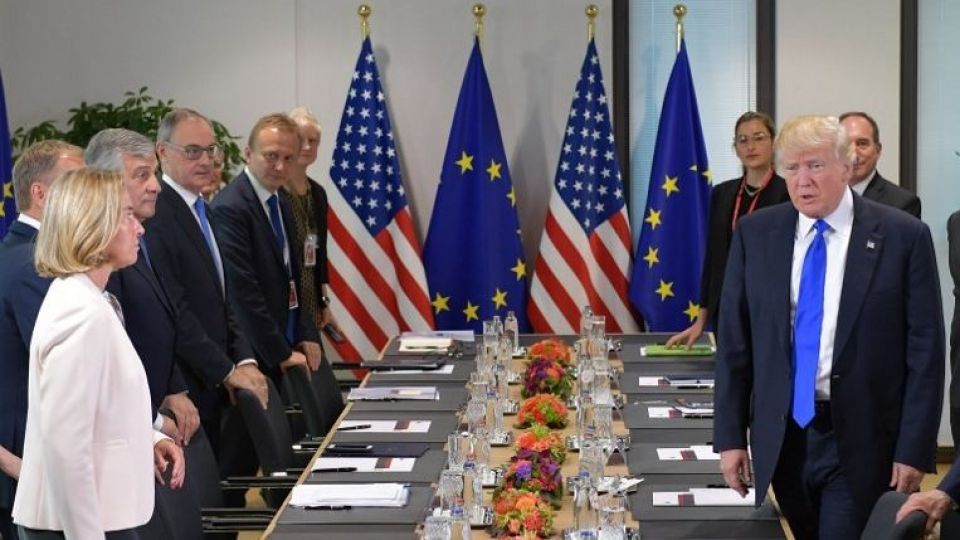The history of the current divide between the EU and the US in some way returns to the post-Cold War changes in the international system and the emergence of powers such as China. The kind of American approach to these developments has weakened the political, economic, and security bonds between the two sides of the Atlantic during the Cold War due to a common threat called the Soviet Union.
During Obama’s presidency, these ties became a little weaker as the United States shifted its approach to the developments in East Asia to confront the threat of China, but Obama tried to manage international affairs, especially the Middle East crisis, through multilateralism, dialogue, and negotiation with Europeans and boosted Europe’s role; but under Donald Trump the gap widened and after taking over as president Trump made it clear that his top priority is American interests and that he no longer wants to spend on security of others. These position adopted by Trump was the starting point for deepening the gap between Europe and the US in recent times.
Also the developments in the Middle East and the different perceptions of the security and threat concept between Europe and the US have virtually made Europeans no longer trust the United States the way they did decades ago.
Meanwhile, German Chancellor Angela Merkel and French President Emmanuel Macron have explicitly emphasized in recent years that Europe must be self-sufficient in providing security and resolving the problems and threats it faces. In this respect, the policy announced by French President Emmanuel Macron on resuming relations with Russia is noteworthy. Macron in late August explained three times why Russia’s proximity to Europe has become imperative in French foreign policy.
With regard to Russian-European relations, it should be noted that Russia has been a threat, a partner, and a rival for Europeans on differing occasions in the past few centuries. Because Russia and Europe are in close proximity to each other, they have always tried to cooperate and coexist or compete and war in the military arena. During the Cold War, due to the communist ideology of the Soviet Union, it was a common threat to the US and Europe, but after the end of the Cold War and the collapse of the Soviet Union and communist regimes in Eastern Europe, the United States sought to continue to keep Russia as a threat to Europeans and keep the NATO security umbrella over Europe under that pretext.
The issue of deploying anti-missile systems in Poland and the Czech Republic was one of these cases that were suspended during the Obama presidency but today Trump again speaks about deployment of the system in Romania and Poland and is in the process of its implementation.
The type of outlook Europe and US have towards Russia has been one of the differences between the two sides of the Atlantic. After the Ukraine crisis, the Europeans tried to manage the crisis by way of negotiations, but the Americans feeling no threat from Russia were more aggressive and insolent to the European policies. This led to a rise in the tendency of right-wing parties in Europe to speak of friendship and cooperation with Russia. Following this, European politicians and leaders wondered why Europeans should pay the costs of tension and conflict with Russia for countries that have no benefit for them.
For this reason, there is still no coherent policy among European governments against Russia, part of which is due to US policy towards Moscow, which prevents European governments from drawing close to Russia, as it could end up in Washington’s disadvantage.
Transatlantic disagreements are now much more pronounced than before; Europeans are somehow trying to reduce Russia’s threat within the framework of security self-reliance so that they can gradually achieve a common foreign and security policy.
Finally, it should be noted that the United States has shown in different terms, especially under Donald Trump that it does not regard Europe a close ally; withdrawal from the Paris Climate Agreement, pulling out of many trade treaties, and leaving the Joint Comprehensive Plan of Action (JCPOA) contrary to the wishes of European governments indicates that the political and historical bonds between the two sides of the Atlantic are fading, because their common interests have diminished.
In the short term, however, one cannot expect serious tension or disagreement between Brussels and Washington, as US and European economic dependence and cohesion are so large that it does not allow for a deep divide between the two sides, but no doubt these differences in different areas will affect the evolution of global crisis management. At the same time, some of the threats to European governments, especially from the Middle East and North Africa, will increase because the US will no longer pay attention to the region, as it has focused more on East Asia and confronting China.










0 Comments